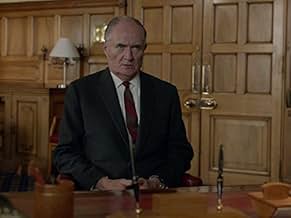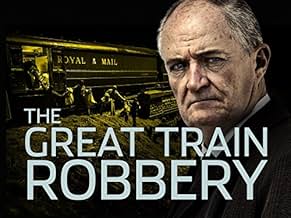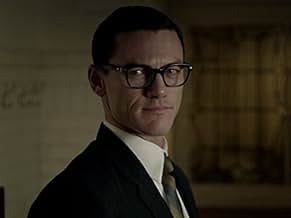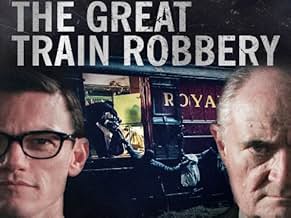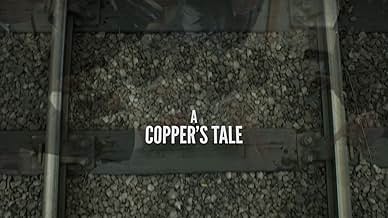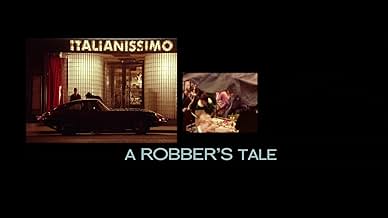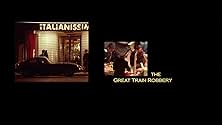VALUTAZIONE IMDb
7,3/10
5291
LA TUA VALUTAZIONE
Aggiungi una trama nella tua linguaA two-part drama which portrays The Great Train Robbery of 8 August 1963, firstly from the point of view of the robbers and then from the point of view of the police who set out to identify ... Leggi tuttoA two-part drama which portrays The Great Train Robbery of 8 August 1963, firstly from the point of view of the robbers and then from the point of view of the police who set out to identify and catch the robbers.A two-part drama which portrays The Great Train Robbery of 8 August 1963, firstly from the point of view of the robbers and then from the point of view of the police who set out to identify and catch the robbers.
- Nominato ai 1 BAFTA Award
- 4 candidature totali
Sfoglia gli episodi
Recensioni in evidenza
This two part drama was a retelling of the The Great Train of 1963. The first part was the Robbers Tale which was a straightforward story of the planning and execution of the robbery.
This was the most fascinating aspect of the drama as over the years, the personalities of some of the robbers (Ronnie Biggs, Buster Edwards) has overshadowed the events of the Train Robbery and the main players involved.
Luke Evans, Martin Compston and Paul Anderson give the best performances.
The second part was the Policeman's Tale and featured Jim Broadbent as DCS Butler, hell bent in getting the gang like the sheriff of an old wild west town which was very much how he was introduced.
This was more procedural and not as interesting or riveting as the first part.
Incidentally both parts had different directors but Butler was just too much of a dullard and Broadbent looks too old to even be playing a cop on the verge of retirement.
Able support by Robert Glenister. It is interesting to see that 'Slipper of the Yard' (played by Nick Moran) who in later years seemed to have been more prominent in the media as the cop hunting the train robbers was a more secondary character in this drama.
Well now Slipper is dead he will not be able to sue for his lack of prominence. In the past when he was alive he was rather quick to shout libel for any slight stain on his character!
This was the most fascinating aspect of the drama as over the years, the personalities of some of the robbers (Ronnie Biggs, Buster Edwards) has overshadowed the events of the Train Robbery and the main players involved.
Luke Evans, Martin Compston and Paul Anderson give the best performances.
The second part was the Policeman's Tale and featured Jim Broadbent as DCS Butler, hell bent in getting the gang like the sheriff of an old wild west town which was very much how he was introduced.
This was more procedural and not as interesting or riveting as the first part.
Incidentally both parts had different directors but Butler was just too much of a dullard and Broadbent looks too old to even be playing a cop on the verge of retirement.
Able support by Robert Glenister. It is interesting to see that 'Slipper of the Yard' (played by Nick Moran) who in later years seemed to have been more prominent in the media as the cop hunting the train robbers was a more secondary character in this drama.
Well now Slipper is dead he will not be able to sue for his lack of prominence. In the past when he was alive he was rather quick to shout libel for any slight stain on his character!
I enjoyed this first episode although of course we all know the story. And an important part of the story is that it all happened in August of 1963. Now I was only 4 years old that year so cant quite remember what the summer of '63 was like but I would bet a large amount of money (maybe even 2.1 million pounds)on a couple of things...first there were probably leaves on the trees and secondly it is doubtful that there was snow on the ground and indeed falling in London...in the middle of August!!! What were the producers thinking? During the episode there are several captions giving the date...including the 8th August 1963. Why or why did they create a setting that looked like January or February! There wasn't even any attempt to produce a blue sky! A good film, well acted and written but ruined by the weather! Only in England!!!
Broadcast in two parts - "The Robber's Tale" and "The Copper's Tale" - THE GREAT TRAIN ROBBERY retells the famous events of August 1963 when over £2m. was stolen from a mail train traveling from Glasgow to London. The events have been extensively retold elsewhere, notably in Peter Yates' fictionalized version ROBBERY (1967) with Stanley Baker, or BUSTER (1988) a comedy-drama with Phil Collins as robber Buster Edwards. "The Robber's Tale" (dir. Julian Jarrold) focuses specifically on Bruce Reynolds (Luke Evans) as the brains behind the whole operation; the more celebrated crook Ronald Biggs (Jack Gordon) - who passed away the night the program received its first broadcast - receives scant attention. "The Copper's Tale" looks at the painstaking ways in which Tommy Butler (Jim Broadbent) went about investigating the case and bringing the criminals to justice. Stylistically speaking the production is very much in keeping with current British television costume dramas, with low-key, almost washed-out lighting, lots of period detail (for example, the obligatory London bus from the mid-Sixties) passing across the back of the frame, or a couple of young mothers pushing their prams round the park) and plenty of focus on character through shot/reverse shot sequences. The style is diffuse, with the emphasis placed on ambiance as much as plot. "The Robber's Tale" actually proves something of a disappointment; not a lot happens in terms of action, while some of the (predominantly youthful) cast simply do not seem convincing as mid- Sixties London hoodlums. Perhaps they might have done more research into the behavior, mannerisms and (most significantly) the argot of that period. "The Copper's Tale" is a lot better, not least because of the interplay - or should that be rivalry - between Butler and his immediate subordinate Frank Williams (Robert Glenister). Although ostensibly on the same side, they seem unable to form a united front, at least professionally. Butler might be a good cop, but he certainly lacks any management abilities.
At the time, the Great Train Robbery was the biggest theft in British criminal history and was as much a part of 1963 here as the Profumo Scandal and the emergence of the Beatles. With the fiftieth anniversary of significant events in that year being commemorated right left and centre (the making of the first Beatles album, the first Dr Who TV show, of course the Kennedy assassination), I guess this notorious occurrence was also too big to miss.
With a large cast consisting of some of the best of British male acting talent (female characters hardly get a look-in), painstakingly accurate set design not to mention the actual train itself, the component parts were all there and waiting to be assembled into place. The imaginative decision to break it into two films, the first part concerning the planning and execution of the crime itself and focusing on the criminal gangs which came together to do the misdeed, the second, the aftermath, concentrating on the police investigation run by Jim Broadbent's tough-as-old-boots D.I Tommy Butler, was, on paper, a good one and for the first half certainly successful.
In part one, we see the scheme being formulated by Luke Fisher's bespectacled (obviously marking him out as the brains) Bruce Reynolds the coordinator of the operation, including the recruitment of the necessary personnel, implementation of the crime and the plan on how to escape the law after the robbery. Pacily directed and well-acted by the whole group, the viewer is completely taken into the criminal world and despite myself, caught up in the anticipation and even excitement as they set about their dirty work. I must admit my distaste at the scene where they realise the enormity of what they've done and celebrate with abandon, even though I knew they didn't get away with it for long.
Which leads onto part two, which I felt was altogether less successful. The narrative changes tack and now follows the police investigation into the crime with Broadbent and his weary men one by one picking off the assembled pictures of the perpetrators on their incident-room notice board. Unfortunately at this point the director decides that Broadbent and his team are the UK equivalent of The Untouchables so that we get endless shots of Broadbent grimly gazing at the camera and when they walk, it's in De Palma-esque slow-motion. All the artifice that was stripped away in the impressive first 90 minutes is overloaded into the second one and while there's still drama in watching all the villains get their come-uppance, you completely lose the sense of authenticity built up thus far. The soundtrack was confusing too, quite why 50's Frank Sinatra songs proliferate, I can't tell and for some reason the great Spencer Davis Group song "I'm A Man", cut in 1966 gets played as the background to events from three years before. The use of Nina Simone songs, especially "Sinner Man" did work better but again, like the overall production, they only got this part half-right too.
I almost thought that the two parts must have been directed by two different directors but no, it was just poor execution of a good plan, sort of like how the robbers handled their getaway.
With a large cast consisting of some of the best of British male acting talent (female characters hardly get a look-in), painstakingly accurate set design not to mention the actual train itself, the component parts were all there and waiting to be assembled into place. The imaginative decision to break it into two films, the first part concerning the planning and execution of the crime itself and focusing on the criminal gangs which came together to do the misdeed, the second, the aftermath, concentrating on the police investigation run by Jim Broadbent's tough-as-old-boots D.I Tommy Butler, was, on paper, a good one and for the first half certainly successful.
In part one, we see the scheme being formulated by Luke Fisher's bespectacled (obviously marking him out as the brains) Bruce Reynolds the coordinator of the operation, including the recruitment of the necessary personnel, implementation of the crime and the plan on how to escape the law after the robbery. Pacily directed and well-acted by the whole group, the viewer is completely taken into the criminal world and despite myself, caught up in the anticipation and even excitement as they set about their dirty work. I must admit my distaste at the scene where they realise the enormity of what they've done and celebrate with abandon, even though I knew they didn't get away with it for long.
Which leads onto part two, which I felt was altogether less successful. The narrative changes tack and now follows the police investigation into the crime with Broadbent and his weary men one by one picking off the assembled pictures of the perpetrators on their incident-room notice board. Unfortunately at this point the director decides that Broadbent and his team are the UK equivalent of The Untouchables so that we get endless shots of Broadbent grimly gazing at the camera and when they walk, it's in De Palma-esque slow-motion. All the artifice that was stripped away in the impressive first 90 minutes is overloaded into the second one and while there's still drama in watching all the villains get their come-uppance, you completely lose the sense of authenticity built up thus far. The soundtrack was confusing too, quite why 50's Frank Sinatra songs proliferate, I can't tell and for some reason the great Spencer Davis Group song "I'm A Man", cut in 1966 gets played as the background to events from three years before. The use of Nina Simone songs, especially "Sinner Man" did work better but again, like the overall production, they only got this part half-right too.
I almost thought that the two parts must have been directed by two different directors but no, it was just poor execution of a good plan, sort of like how the robbers handled their getaway.
In 1963, 75 km (46 miles) north of London, about 17 blokes pinched a train with a coach containing millions of pounds of cash being transported via Her Majesty's Royal Mail. It was the biggest heist in British history in which the perpetrators lifted about £2.6 million (about £50 million in today's money or $80 million). Because of the amount of money which was taken from the British government instead of a private party, an all-out investigation ensued. Eventually, about 2/3rds of the members were arrested and sent to prison. Since the heist many films and references to the heist have appeared in popular culture, including a line in the Beatles' film "Help" in which Lennon asks a Scotland Yard detective how the heist investigation is coming.
The current film, a made-for-television miniseries in 2013, is probably the best screen adaption of the heist, presenting the events in two parts. The first is from the point-of-view of the criminals, called "A Robber's Tale", and the second from the view of the investigators called "A Copper's Tale". Both segments are equally compelling with outstanding actors showing us how the crime is viewed from different sides of the railroad tracks, so to speak. Two sets of casts are used for each segment, until the very end of the second segment in which characters from both segments begin interacting.
Bruce Reynolds (Luke Evans) is the mastermind and leader of the heist. Their first large job, an airport heist in 1962, yields not nearly as much in cash as they had hoped, around £65,000 (about £1.25 million or $2 million today, which seems like a lot of money!). They were hoping for a bigger payoff. Through a tip, they discover a train bound for London from Glasgow, Scotland, contains a coach designated as Her Majesty's Royal Mail. In addition to the typical mail, the car also contains sacks of cash, pound notes probably being taken out of circulation. Reynolds resolves to pilfer the sacks of cash and puts together a team to engage the heist, including someone who claims he can stop trains. They find an old abandoned farm as a temporary hideout. As events play out, the teams hits unexpected twists in their plan, including the amount of money which turns out, like the airport heist, not to be what was expected...
The second part then chronicles the investigation and eventual arrests of members of the heist gang. Tommy Butler (Jim Broadbent) leads the Scotland Yard investigation. Butler is not only shrewd but uncompromising. He decides the best means for a successful apprehension of the criminals is to keep information close to his chest as his second-in-command Frank Williams (Robert Glenister) points out. He also forces his team to work long hours with little rest. Then the upper echelons of Scotland Yard, probably due to pressure from members of Parliament, decide to release the names and photos of the known perpetrators to the public, much to the objections of Butler and Williams. The releasing of information, as Butler and Williams predicts, leads to disastrous results, further compromising the investigation.
A very enjoyable and well-acted series. Evans makes a good Reynolds, who is not exactly a ruthless criminal but definitely uses rationalization to justify the heist. Broadbent makes a fine Butler, whose aloofness may compromise the success of the investigation. He's tempered by Robert Glenister as Frank Williams who seems the primary voice of reason during the investigation. If you like heist films, this is a real one, and it demonstrates these crimes as not nearly as easy to pull off as you would imagine if you've seen "Ocean's 11".
The current film, a made-for-television miniseries in 2013, is probably the best screen adaption of the heist, presenting the events in two parts. The first is from the point-of-view of the criminals, called "A Robber's Tale", and the second from the view of the investigators called "A Copper's Tale". Both segments are equally compelling with outstanding actors showing us how the crime is viewed from different sides of the railroad tracks, so to speak. Two sets of casts are used for each segment, until the very end of the second segment in which characters from both segments begin interacting.
Bruce Reynolds (Luke Evans) is the mastermind and leader of the heist. Their first large job, an airport heist in 1962, yields not nearly as much in cash as they had hoped, around £65,000 (about £1.25 million or $2 million today, which seems like a lot of money!). They were hoping for a bigger payoff. Through a tip, they discover a train bound for London from Glasgow, Scotland, contains a coach designated as Her Majesty's Royal Mail. In addition to the typical mail, the car also contains sacks of cash, pound notes probably being taken out of circulation. Reynolds resolves to pilfer the sacks of cash and puts together a team to engage the heist, including someone who claims he can stop trains. They find an old abandoned farm as a temporary hideout. As events play out, the teams hits unexpected twists in their plan, including the amount of money which turns out, like the airport heist, not to be what was expected...
The second part then chronicles the investigation and eventual arrests of members of the heist gang. Tommy Butler (Jim Broadbent) leads the Scotland Yard investigation. Butler is not only shrewd but uncompromising. He decides the best means for a successful apprehension of the criminals is to keep information close to his chest as his second-in-command Frank Williams (Robert Glenister) points out. He also forces his team to work long hours with little rest. Then the upper echelons of Scotland Yard, probably due to pressure from members of Parliament, decide to release the names and photos of the known perpetrators to the public, much to the objections of Butler and Williams. The releasing of information, as Butler and Williams predicts, leads to disastrous results, further compromising the investigation.
A very enjoyable and well-acted series. Evans makes a good Reynolds, who is not exactly a ruthless criminal but definitely uses rationalization to justify the heist. Broadbent makes a fine Butler, whose aloofness may compromise the success of the investigation. He's tempered by Robert Glenister as Frank Williams who seems the primary voice of reason during the investigation. If you like heist films, this is a real one, and it demonstrates these crimes as not nearly as easy to pull off as you would imagine if you've seen "Ocean's 11".
Lo sapevi?
- QuizRonald Biggs, one of the last surviving Great Train Robbers, died on 18 December 2013, the same day that this two-part series was first shown.
- BlooperPolice Officers are shown wearing white shirts. In 1963 Constables and Sergeants in all English police forces wore blue shirts. The change to white shirts came in the late 1970s.
- ConnessioniReferences 1855 - La prima grande rapina al treno (1978)
I più visti
Accedi per valutare e creare un elenco di titoli salvati per ottenere consigli personalizzati
- How many seasons does The Great Train Robbery have?Powered by Alexa
Dettagli
- Data di uscita
- Paese di origine
- Sito ufficiale
- Lingua
- Celebre anche come
- 火車大劫案
- Luoghi delle riprese
- Aziende produttrici
- Vedi altri crediti dell’azienda su IMDbPro
- Tempo di esecuzione1 ora 30 minuti
- Colore
Contribuisci a questa pagina
Suggerisci una modifica o aggiungi i contenuti mancanti

Divario superiore
What is the French language plot outline for The Great Train Robbery (2013)?
Rispondi


